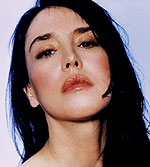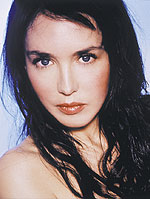If you didn’t know better, you’d say she’s from California and raised on Jane Fonda’s workout books and avocado salads. But no, she’s as Parisian as they come. The daughter of a German mother and Algerian father, and mother herself to a half-English son, Isabelle Adjani’s life and persona capture the spirit of contemporary Europe. At home in half a dozen cities, at ease in a flock of languages, Adjani’s world bridges two lifestyles — the Anglo-American and the French. Marked by her need to give these cultures daily meaning via their best literature and art, Adjani’s Paris is the one that expats embrace.
Trapped at times by media attention that celebrates lively temperaments with beautiful lips and hair, Adjani has a hard time convincing the press that she’s more interested in ideas and quality than quick fame. But it’s true.
The last glimpse I got of Isabelle Adjani was as a spectator. She dominated center stage in the role of Marguerite Gautier in René de Ceccatty’s adaptation of the Alexandre Dumas (fils) novel “La Dame aux Camélias” — at French business magnate and arts patron François Pinault's Théâtre de Marigny — where for 107 sold-out performances, at the end of 2000, Parisian audiences were enthralled by Adjani’s rendition of a widow whose survival is intimately connected with her ascendancy over needy males. Kind of like a big, feminine preying mantis... The role, everyone said, was created for Adjani.
Admittedly, there’s some anxiety attached to meeting a carnivorous insect for lunch. And the pile of articles I’d read on Adjani the reclusive, Adjani the inaccessible, Adjani the rebel, didn’t help. Her skepticism toward media that have successively spread erroneous AIDS rumours in 1987, scoured her relationship with actor Daniel Day Lewis, and exploited her refusal to attend an Elysée Palace dinner in honor of Algerian President Bouteflika (whom she labels “a falsely democratic, despot in disguise,”) would be enough to put anyone on edge.
We start in English, dropping into her native French for a word or two, here or there. She loves English — and speaks like she grew up in Modesto — although she’s played in only a handful of Anglo-Saxon productions. Yet, her Muttersprache is German. Her mother lives in Paris, but comes from Bavaria. (Adjani’s only German performance was in Werner Herzog’s Nosferatu.) French by default — her father was a garage mechanic whose non-verbal effect on his daughter is apparent in practically everything. “I don’t feel French at all. But with my parents being immigrants, Je me sens très nomade en fait. Une parcoureuse du monde. And, I feel very European too, c’est normal.”
As Adjani speaks her irises look at you deeply for a split second before dancing away, as she searches for her words. It’s clear that as an actress the emotion comes first, and the words follow. And this was the big revelation — nothing is rehearsed with Isabelle Adjani. She answers everything as if it’s just been asked for the first time. And, there is poise even in this halting pursuit of eloquence.
Currently back in the limelight co-starring with Sami Frey in a new film by Lætitia Masson, auteur of En avoir ou pas and A Vendre, Adjani is at peace with a directing style that draws out her natural talents and imposes nothing from the outside. “Lætitia is one of those directors who doesn’t wish you to work or prepare in advance. Her master is Goddard, so she works from his aura.”
Shot in Paris, the south of France and Morocco in just nine weeks, the film is a “modern tale inspired by the Barefoot Contessa.” No one is saying much more — there’s a black-out on the plot-line, although Adjani hints that the story is about a woman who comes out of jail and tries to believe in life and love again. No surprise. “It’s not about the big machine of cinema, and that’s the scale I love working on.” The role again seems perfect for Isabelle Adjani just now, who admits that she’s emerging from a long period of emotional enslavement related to her disillusioned love affair with Daniel Day Lewis. “It’s like I wasted ten years,” she laments, then adds, “and saved the rest of my life.”
Comfortable talking about herself, although a bit guarded, Isabelle speaks about the benefits of psychotherapy which has been an intensive part of her daily routine since the mid-’90s. “Very Freudian,” she states, and admits that much has to do with unresolved issues of guilt following the death — in 1985 — of her father whom she describes as dark and depressive. “Like most little girls I just wanted to bring him happiness.”
Today, Adjani seems to have broken way from approval-seeking “neediness” and yet, as an actress, she thinks of her métier as second parents. “I started my career before I was an adult, and the audience became the judges of what I do. The first sign of my adulthood is not trying to be understood anymore,” she adds. “I’ve made a decision not to be bothered by all the pressures. I couldn’t care less. I can say no.”
The subject shifts to reading and she takes on an apologetic air. “I know it sounds a bit dusty but I’m getting progressively old-fashioned. I’m going back to great French literature like Proust, Balzac, Mallarmé and Racine.” She unleashes a loud, nervous laugh. — “Corny and reactionary, huh.” The cold, impersonal speed of technology frightens her, too. She watches almost no television and reads few newspapers. The Internet for her is “like police recordings, the Secret Service that has gone public. False authority.” She gets particularly animated and calls the world “schizophrenizé,” “mythomanizé.” “It’s the Matrix, and it has come true.”
“Wouldn’t you like to be better known internationally?” I finally ask. She takes a swallow of coffee and shakes her head. “I could have done a big commercial film like ‘Pretty Woman.’ It’s just not me. I don’t want to be the most famous person in the world. I don’t want to be the richest either. Other very beautiful and talented actresses do that very well. For me, that energy isn’t cosmic — it’s cosmetic.” If there isn’t substance and soul, Adjani is no longer interested. And that doesn’t make for a good story in the Parisian glossies.
Paris writer and editor David Applefield initially wrote on Isabelle Adjani for The Financial Times.





